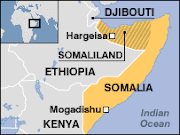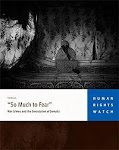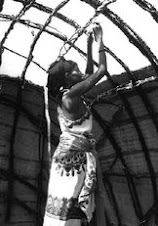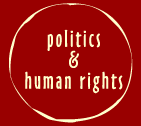
FOUR AMERICAN PETROLEUM GIANTS HAD AGREEMENTS WITH THE AFRICAN NATION BEFORE ITS CIVIL WAR BEGAN. THEY COULD REAP BIG REWARDS IF PEACE IS RESTORED By MARK FINEMAN.
(
Mark Fineman, died in Baghdad in September 2003 of a heart attack. He was 51 years old. He was also a great journalist, and a lot of fun to hang out with. He will be missed.)
DATELINE: MOGADISHU, Somalia
Far beneath the surface of the tragic drama of Somalia, four major U.S. oil companies are quietly sitting on a prospective fortune in exclusive concessions to explore and exploit tens of millions of acres of the Somali countryside.
That land, in the opinion of geologists and industry sources, could yield significant amounts of oil and natural gas if the U.S.-led military mission can restore peace to the impoverished East African nation.
According to documents obtained by The Times, nearly two-thirds of Somalia was allocated to the American oil giants Conoco, Amoco, Chevron and Phillips in the final years before Somalia's pro-U.S. President Mohamed Siad Barre was overthrown and the nation plunged into chaos in January, 1991. Industry sources said the companies holding the rights to the most promising concessions are hoping that the Bush Administration's decision to send U.S. troops to safeguard aid shipments to Somalia will also help protect their multimillion-dollar investments there.
Officially, the Administration and the State Department insist that the U.S. military mission in Somalia is strictly humanitarian. Oil industry spokesmen dismissed as "absurd" and "nonsense" allegations by aid experts, veteran East Africa analysts and several prominent Somalis that President Bush, a former Texas oilman, was moved to act in Somalia, at least in part, by the U.S. corporate oil stake.
But corporate and scientific documents disclosed that the American companies are well positioned to pursue Somalia's most promising potential oil reserves the moment the nation is pacified. And the State Department and U.S. military officials acknowledge that one of those oil companies has done more than simply sit back and hope for pece.
Conoco Inc., the only major multinational corporation to mantain a functioning office in Mogadishu throughout the past two years of nationwide anarchy, has been directly involved in the U.S. government's role in the U.N.-sponsored humanitarian military effort.
Conoco, whose tireless exploration efforts in north-central Somalia reportedly had yielded the most encouraging prospects just before Siad Barre's fall, permitted its Mogadishu corporate compound to be transformed into a de facto American embassy a few days before the U.S. Marines landed in the capital, with Bush's special envoy using it as his temporary headquarters. In addition, the president of the company's subsidiary in Somalia won high official praise for serving as the government's volunteer "facilitator" during the months before and during the U.S. intervention.
Describing the arrangement as "a business relationship," an official spokesman for the Houston-based parent corporation of Conoco Somalia Ltd. said the U.S. government was paying rental for its use of the compound, and he insisted that Conoco was proud of resident general manager Raymond Marchand's contribution to the U.S.-led humanitarian effort.
John Geybauer, spokesman for Conoco Oil in Houston, said the company was acting as "a good corporate citizen and neighbor" in granting the U.S. government's request to be allowed to rent the compound. The U.S. Embassy and most other buildings and residential compounds here in the capital were rendered unusable by vandalism and fierce artillery duels during the clan wars that have consumed Somalia and starved its people.
In its in-house magazine last month, Conoco reprinted excerpts from a letter of commendation for Marchand written by U.S. Marine Brig. Gen. Frank Libutti, who has been acting as military aide to U.S. envoy Robert B. Oakley. In the letter, Libutti praised the oil official for his role in the initial operation to land Marines on Mogadishu's beaches in December, and the general concluded, "Without Raymond's courageous contributions and selfless service, the operation would have failed."
But the close relationship between Conoco and the U.S. intervention force has left many Somalis and foreign development experts deeply troubled by the blurry line between the U.S. government and the large oil company, leading many to liken the Somalia operation to a miniature version of Operation Desert Storm, the U.S.-led military effort in January, 1991, to drive Iraq from Kuwait and, more broadly, safeguard the world's largest oil reserves.
"They sent all the wrong signals when Oakley moved into the Conoco compound," said one expert on Somalia who worked with one of the four major companies as they intensified their exploration efforts in the country in the late 1980s.
"It's left everyone thinking the big question here isn't famine relief but oil -- whether the oil concessions granted under Siad Barre will be transferred if and when peace is restored," the expert said. "It's potentially worth billions of dollars, and believe me, that's what the whole game is starting to look like."
Although most oil experts outside Somalia laugh at the suggestion that the nation ever could rank among the world's major oil producers -- and most maintain that the international aid mission is intended simply to feed Somalia's starving masses -- no one doubts that there is oil in Somalia. The only question: How much?
"It's there. There's no doubt there's oil there," said Thomas E. O'Connor, the principal petroleum engineer for the World Bank, who headed an in-depth, three-year study of oil prospects in the Gulf of Aden off Somalia's northern coast.
"You don't know until you study a lot further just how much is there," O'Connor said. "But it has commercial potential. It's got high potential . . . once the Somalis get their act together."
O'Connor, a professional geologist, based his conclusion on the findings of some of the world's top petroleum geologists. In a 1991 World Bank-coordinated study, intended to encourage private investment in the petroleum potential of eight African nations, the geologists put Somalia and Sudan at the top of the list of prospective commercial oil producers.
Presenting their results during a three-day conference in London in September, 1991, two of those geologists, an American and an Egyptian, reported that an analysis of nine exploratory wells drilled in Somalia indicated that the region is "situated within the oil window, and thus (is) highly prospective for gas and oil." A report by a third geologist, Z. R. Beydoun, said offshore sites possess "the geological parameters conducive to the generation, expulsion and trapping of significant amounts of oil and gas."
Beydoun, who now works for Marathon Oil in London, cautioned in a recent interview that on the basis of his findings alone, "you cannot say there definitely is oil," but he added: "The different ingredients for generation of oil are there. The question is whether the oil generated there has been trapped or whether it dispersed or evaporated."
Beginni 1986, Conoco, along with Amoco, Chevron, Phillips and, briefly, Shell all sought and obtained exploration licenses for northern Somalia from Siad Barre's government. Somalia was soon carved up into concessional blocs, with Conoco, Amoco and Chevron winning the right to explore and exploit the most promising ones.
The companies' interest in Somalia clearly predated the World Bank study. It was grounded in the findings of another, highly successful exploration effort by the Texas-based Hunt Oil Corp. across the Gulf of Aden in the Arabian Peninsula nation of Yemen, where geologists disclosed in the mid-1980s that the estimated 1 billion barrels of Yemeni oil reserves were part of a great underground rift, or valley, that arced into and across northern Somalia.
Hunt's Yemeni operation, which is now yielding nearly 200,000 barrels of oil a day, and its implications for the entire region were not lost on then-Vice President George Bush.
In fact, Bush witnessed it firsthand in April, 1986, when he officially dedicated Hunt's new $18-million refinery near the ancient Yemeni town of Marib. In remarks during the event, Bush emphasized the critical value of supporting U.S. corporate efforts to develop and safeguard potential oil reserves in the region.
In his speech, Bush stressed "the growing strategic importance to the West of developing crude oil sources in the region away from the Strait of Hormuz," according to a report three weeks later in the authoritative Middle East Economic Survey.
Bush's reference was to the geographical choke point that controls access to the Persian Gulf and its vast oil reserves. It came at the end of a 10-day Middle East tour in which the vice president drew fire for appearing to advocate higher oil and gasoline prices.
"Throughout the course of his 17,000-mile trip, Bush suggested continued low (oil) prices would jeopardize a domestic oil industry 'vital to the national security interests of the United States,' which was interpreted at home and abroad as a sign the onetime oil driller from Texas was coming to the aid of his former associates," United Press International reported from Washington the day after Bush dedicated Hunt's Yemen refinery.
No such criticism accompanied Bush's decision late last year to send more than 20,000 U.S. troops to Somalia, widely applauded as a bold and costly step to save an estimated 2 million Somalis from starvation by opening up relief supply lines and pacifying the famine-struck nation.
But since the U.S. intervention began, neither the Bush Administration nor any of the oil companies that had been active in Somalia up until the civil war broke out in early 1991 have commented publicly on Somalia's potential for oil and natural gas production. Even in private, veteran oil company exploration experts played down any possible connection between the Administration's move into Somalia and the corporate concessions at stake.
"In the oil world, Somalia is a fringe exploration area," said one Conoco executive who asked not to be named. "They've overexaggerated it," he said of the geologists' optimism about the prospective oil reserves there. And as for Washington's motives in Somalia, he brushed aside criticisms that have been voiced quietly in Mogadishu, saying, "With America, there is a genuine humanitarian streak in us . . . that many other countries and cultures cannot understand."
But the same source added that Conoco's decision to maintain its headquarters in the Somali capital even after it pulled out the last of its major equipment in the spring of 1992 was certainly not a humanitarian one. And he confirmed that the company, which has explored Somalia in three major phases beginning in 1952, had achieved "very good oil shows" -- industry terminology for an exploration phase that often precedes a major discovery -- just before the war broke out.
"We had these very good shows," he said. "We were pleased. That's why Conoco stayed on. . . . The people in Houston are convinced there's oil there."
Indeed, the same Conoco World article that praised Conoco's general manager in Somalia for his role in the humanitarian effort quoted Marchand as saying, "We stayed because of Somalia's potential for the company and to protect our assets."
Marchand, a French citizen who came to Somalia from Chad after a civil war forced Conoco to suspend operations there, explained the role played by his firm in helping set up the U.S.-led pacification mission in Mogadishu.
"When the State Department asked Conoco management for assistance, I was glad to use the company's influence in Somalia for the success of this mission," he said in the magazine article. "I just treated it like a company operation -- like moving a rig. I did it for this operation because the (U.S.) officials weren't familiar with the environment."
Marchand and his company were clearly familiar with the anarchy into which Somalia has descended over the past two years -- a nation with no functioning government, no utilities and few roads, a place ruled loosely by regional warlords.
Of the four U.S. companies holding the Siad Barre-era oil concessions, Conoco is believed to be the only one that negotiated what spokesman Geybauer called "a standstill agreement" with an interim government set up by one of Mogadishu's two principal warlords, Ali Mahdi Mohamed. Industry sources said the other U.S. companies with contracts in Somalia cited "force majeure" (superior power), a legal term asserting that they were forced by the war to abandon their exploration efforts and would return as soon as peace is restored.
"It's going to be very interesting to see whether these agreements are still good," said Mohamed Jirdeh, a prominent Somali businessman in Mogadishu who is familiar with the oil-concession agreements. "Whatever Siad did, all those records and contracts, all disappeared after he fled. . . . And this period has brought with it a deep change of our society.
"Our country is now very weak, and, of course, the American oil companies are very strong. This has to be handled very diplomatically, and I think the American government must move out of the oil business, or at least make clear that there is a definite line separating the two, if they want to maintain a long-term relationship here."
Fineman, Times bureau chief in Nicosia, Cyprus, was recently in Somalia.
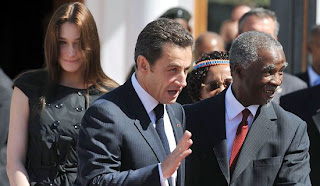 CAPE TOWN, South Africa: French President Nicolas Sarkozy announced a major overhaul of his nation's policies toward Africa on Thursday, saying that its military agreements were outdated and it had no interest in keeping its forces permanently on the continent.
CAPE TOWN, South Africa: French President Nicolas Sarkozy announced a major overhaul of his nation's policies toward Africa on Thursday, saying that its military agreements were outdated and it had no interest in keeping its forces permanently on the continent.
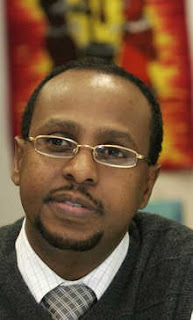

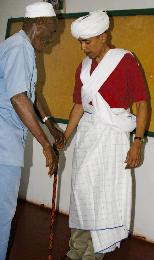


 Reply to all
Reply to all



